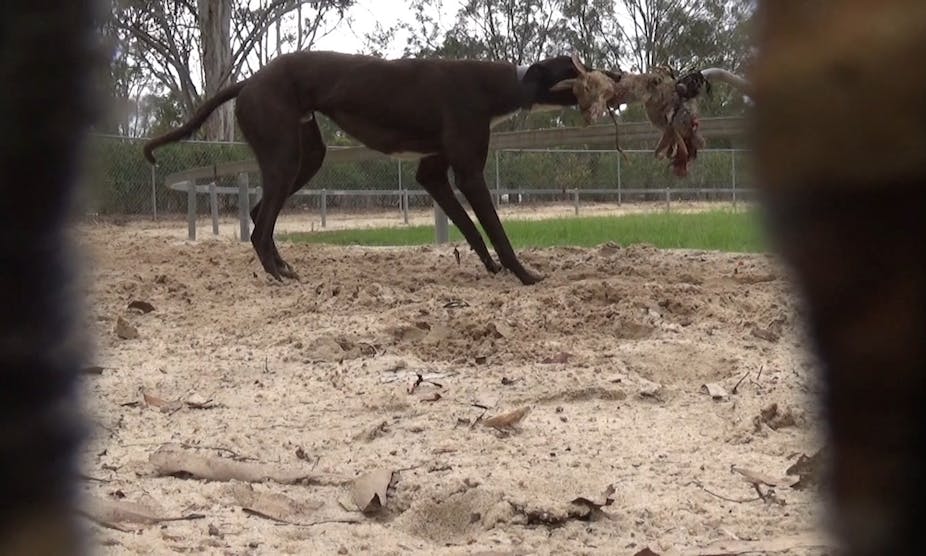Even as senior figures resign in the wake of the ABC Four Corners investigation into the grisly and widespread practice of live baiting in the greyhound industry, new draft laws are set to make life more difficult for the activists who aim to bring this kind of cruelty to light.
As upsetting as the scenes of live baiting were, it was something that we, as a humane and decent society, wanted to know about. We value the truth and don’t want to be unwitting participants in a sport, trade or industry that offends our sensibilities and moral values.
Often it is only through the courage and dedication of activists, whistle-blowers and investigative journalists that we are afforded the benefits of our right to know about misconduct and cruelty. The Four Corners program would not have been possible were it not for the efforts of Animal Liberation Queensland and Animals Australia in covert surveillance of suspected greyhound training facilities.
The program highlighted the complete failure of state greyhound racing’s controlling bodies to detect and prosecute such illegal activities. If they were doing their job, the secret filming would not have been necessary.
Protection for animals or attack on activists?
With such apparent deficiencies in regulatory protections for animals, it may be reassuring to hear of the recent introduction of the federal Criminal Code Amendment (Animal Protection) Bill 2015. According to West Australian Liberal senator Chris Back, the bill is “aimed at enhancing the protection of domestic animals by ensuring that evidence of abuse or malicious cruelty is reported to relevant authorities as soon as practicable”.
It sounds reasonable enough. Unfortunately, however, the content of the bill and its practical operation do not reflect its title or purported intent. In reality, the bill has nothing to do with animal protection.
Instead, it is designed to protect the trading and commercial interests of animal industries. How? By inhibiting those inconvenient investigations that have been so successful in exposing animal cruelty to the general public.
The bill requires all persons who record malicious animal cruelty to report it to relevant authorities (usually the police or the Royal Society for the Prevention of Cruelty to Animals) within one business day or face a fine of more than A$5,000. Notably, the bill is not concerned with those who may witness cruelty firsthand, even if they are in a position of responsibility within an industry or business that involves animals.
The reporting requirement will effectively stop private investigations in their tracks. The police or RSPCA, as the responsible authority, will begin investigating and tell whoever reported the case to cease their own investigations. The response will be “thank you for your assistance, we’ll take it from here”.
Under this system, it will be very difficult to imagine anyone mounting a campaign of covert surveillance that blooms into an industry-wide investigation, such as was so ably delivered by Four Corners.
State animal welfare laws do not provide for such advanced powers of investigation. In most cases, the responsible authority will simply visit the relevant premises and, at most, execute a search warrant. Sometimes there will be evidence to support a prosecution; other times there will not. Each matter will be dealt with on a case-by-case basis. There will be no sustained documentation of routine or systemic incidents of animal abuse within a given facility or industry.
The new law lets down animals
Evidence implicating 70 trainers in three states of numerous animal cruelty offences would simply not have been gathered under a law that requires reporting within one business day. Undercover journalistic investigations take weeks, if not months, to put together.
If the new draft laws were in place today, we would not be seeing the current widespread public condemnation of greyhound racing, the establishment of independent regulatory reviews in several states, the dedication of significantly increased funds to stamp out live baiting, and the anticipated legislative reforms. None of it would be happening. We would be none the wiser. And the live baiting would continue, bar a handful of trainers reported to the police and then inevitably painted by the industry as rogue bad apples.
This is precisely the intention of Senator Back’s proposed bill: to shield animal industries from public scrutiny by keeping the community in the dark about systematic cruelty that may be festering beneath the surface. This proposition should be called out for what it is, and not hidden behind the misleading veil of “enhancing animal protection.”
If Senator Back is really concerned about improving the plight of animals, he should call on state governments to dedicate more funding and resources to animal welfare compliance monitoring, and to increase the powers of regulators under existing animal welfare laws to engage in more sophisticated forms of investigation, including covert surveillance. And at the federal level, he should back proposals for the establishment of an independent statutory body dedicated to animal welfare.
But perhaps most importantly, he should let activists, whistle-blowers and journalists continue their vital public service of enabling our right to know – a crucial service for the proper functioning of our democracy.
In the words of former High Court Justice Michael Kirby (in a case which coincidentally also involved the brutal treatment of possums):
… concerns about animal welfare are clearly legitimate matters of public debate across the nation. Many advances in animal welfare have occurred only because of public debate and political pressure from special interest groups. The activities of such groups have sometimes pricked the conscience of human beings.

